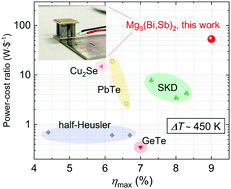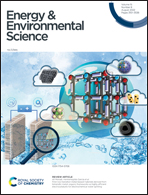Mg3(Bi,Sb)2-based thermoelectric modules for efficient and reliable waste-heat utilization up to 750 K†
Abstract
Thermoelectric modules can directly convert the waste heat released by plants or vehicles into useful electricity, providing a clean and sustainable way to use fossil energy more efficiently. However, their commercial application in power generation, especially at temperatures above 500 K, has proceeded very slowly due to the low module efficiency, scarce or toxic constituent elements, and lack of stable metallization at high temperatures. Here, we develop a highly efficient, environmentally friendly and cost-effective thermoelectric module by using n-type Se-doped Mg3(Bi,Sb)2 and p-type CoSb3-based skutterudite. The module can operate robustly up to 750 K and achieves a conversion efficiency of over 9% under a temperature difference of 450 K, superior to that of state-of-the-art single-stage thermoelectric modules. These achievements result from a comprehensive study involving optimization of the material composition and microstructure, screening for effective diffusion barrier layers, and rational design of the module structure. Our work demonstrates the feasibility and scalability of efficient and reliable thermoelectric modules based on sustainable elements for broad applications in mid-temperature waste heat recovery.



 Please wait while we load your content...
Please wait while we load your content...